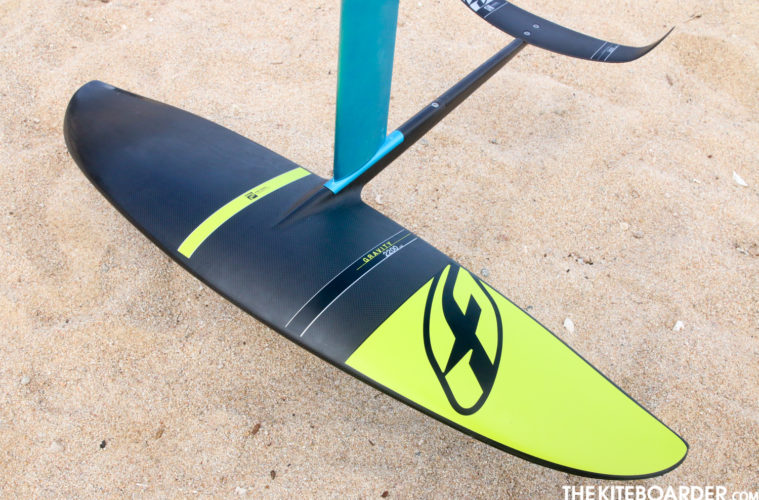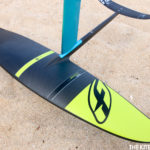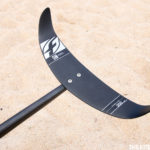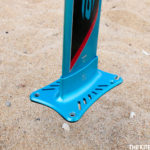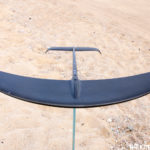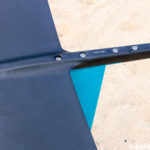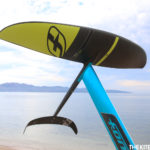F-ONE Gravity 2200 V2
Sizes Available: 1200cm2 front/300cm stab, 1400cm2 front/300cm stab, 1800cm2 front/300cm stab, 2200cm2 front/300cm stab
Sizes Tested: 2200cm2 front wing
F-ONE Says:
The Gravity line of wings is designed for early lift, great stability and efficient pumping. With the new and thicker section profile for an early and very progressive lift-off. Larger area with increased span and high aspect ratio. Easy take-off at low speed, ideal for the smallest waves, good turning ability in waves and bumps. Superior glide on downwinders. Targeted at people looking for maximum lift without compromising glide and control.
The Gravity wings are very easy and stable to learn and progress. Able to fly and get some fun in the most insignificant waves. Very good pumping to go catch the next wave, or the one after! Its stability and glide also make it a perfect wing to use on downwinders. Built with pre-preg carbon for the best weight to strength ratio, with a super-light core.
The Titan connection directly connects the wing to the mast via the Titan mast foot and the fuselage is split in two parts in order to simplify transportation. This setup offers better load transmission and better stiffness throughout the different parts for maximum control.
Visit for more info: https://www.f-one.world/product/gravity-2200/
Tkb Says:
The Gravity series of wings in the 1800 and 2200 sizes are ideal options for the new sport of wingsurfing. Both wings feature a carbon fiber fuselage that bolts together with Torx head bolts for easy assembly and mates with an aluminum mast. The construction brings together an excellent blend between stiffness for crisp performance and robust lifting wings with a nice medium weight. Both setups offer wide wingspans, the 300 stabilizers with the super tall winglets, super slow foil-up speeds, and incredibly stable inputs on all axes, with the yaw axis feeling the most stable of all inputs.
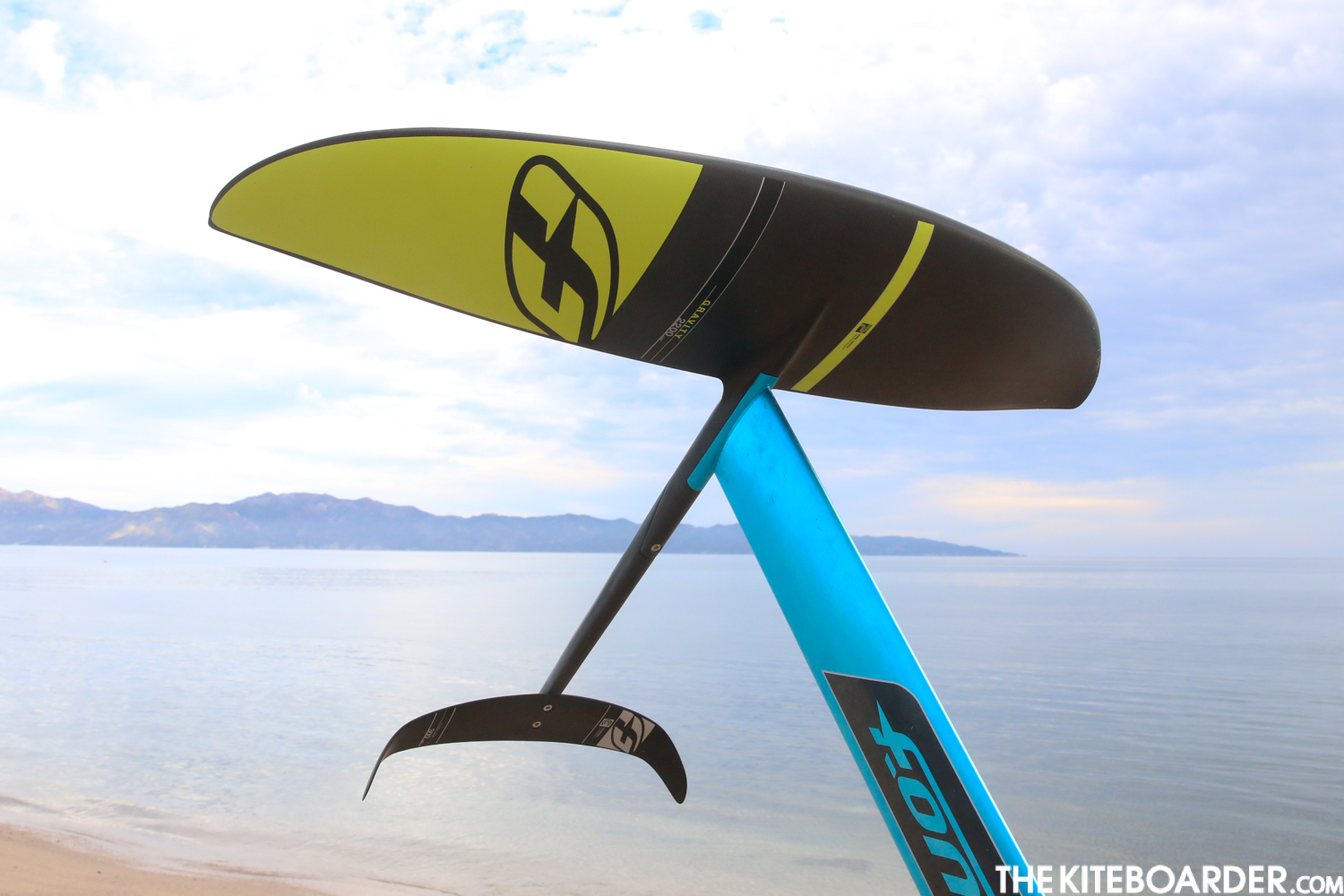 The Gravity 2200 is the big gun that offered the lowest foil-up speed and the most amount of lift. We’d recommend the 2200 for bigger riders that need extra help getting lift-off, and to riders that are challenged by lower wingsurfing wind conditions. If we had a low volume prone board and lighter wind conditions, the 2200 would be very helpful for getting a sinking board up onto plane and in the air. Average-sized riders may find that the 2200’s lift is excessive and might spend more energy trying to keep the wing in the water while trying to ride waves, yet bigger riders will enjoy every bit of that lift. The 2200 has a slower foil-up speed but its lift delivery isn’t quite as smooth as the 1800. When you approach foil-up speed, the 2200 develops a high angle of attack at super slow speed before leveling onto an even pitch. That might seem like a negative, but that’s quite common on such a low-aspect/high lifting wing. The upside is that when you approach foil-down speed, you will feel that same stalling that will warn you about the drop that is coming. The 2200 has a more stable roll axis than the 1800 and has a noticeably slower high-end speed. The 2200 can maintain pump momentum in the flats for quite a long distance, but it’s at a slower speed and cadence. Sometimes the 2200 didn’t want to keep up with the faster moving swells on downwinders, and for that reason we believe the 2200 is a wing for the bigger rider that needs lift at the expense of more agile performance.
The Gravity 2200 is the big gun that offered the lowest foil-up speed and the most amount of lift. We’d recommend the 2200 for bigger riders that need extra help getting lift-off, and to riders that are challenged by lower wingsurfing wind conditions. If we had a low volume prone board and lighter wind conditions, the 2200 would be very helpful for getting a sinking board up onto plane and in the air. Average-sized riders may find that the 2200’s lift is excessive and might spend more energy trying to keep the wing in the water while trying to ride waves, yet bigger riders will enjoy every bit of that lift. The 2200 has a slower foil-up speed but its lift delivery isn’t quite as smooth as the 1800. When you approach foil-up speed, the 2200 develops a high angle of attack at super slow speed before leveling onto an even pitch. That might seem like a negative, but that’s quite common on such a low-aspect/high lifting wing. The upside is that when you approach foil-down speed, you will feel that same stalling that will warn you about the drop that is coming. The 2200 has a more stable roll axis than the 1800 and has a noticeably slower high-end speed. The 2200 can maintain pump momentum in the flats for quite a long distance, but it’s at a slower speed and cadence. Sometimes the 2200 didn’t want to keep up with the faster moving swells on downwinders, and for that reason we believe the 2200 is a wing for the bigger rider that needs lift at the expense of more agile performance.
In summation, the Gravity foils are excellent options for wingsurfing with a good range of sizes that will be both user-friendly and performance-oriented while also offering exceptional build quality.
Want to view all our 2020 Freeride, Light Wind and Wingsurf Gear Reviews in one convenient digital guide? Get free access HERE. If you’re already a subscriber, thank you for your support! Log into your account to view our 2020 Freeride Gear Review Guide.

